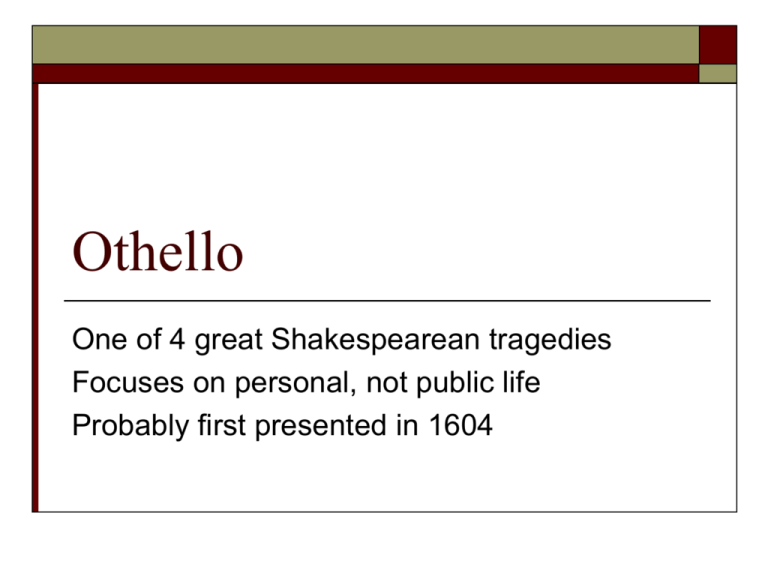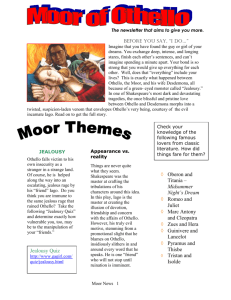Othello
advertisement

Othello One of 4 great Shakespearean tragedies Focuses on personal, not public life Probably first presented in 1604 Jealousy The jealous are possessed by a mad devil and a dull spirit at the same time. Johann Kaspar Lavater Jealousy had a taste, all right. A bitter and tonguestinging flavor, like a peach pit.-- Dolores Hitchens Pure love and suspicion cannot dwell together: at the door where the latter enters, the former makes its exit. Alexandre Dumas Lack of trust Trust—cement that holds relationships together. Jealousy is a virulent form of interpersonal distrust/ Lack of trust is implicit in Othello’s situation from outset of play. Othello is isolated from the world. Othello Story of great man’s fall into the barbarism of human nature Alteration from a noble lover to a raving killer. Based on Italian novella. Major themes Love, jealousy, lack of trust, and revenge. Struggle between good/evil within the human soul Need for self-control Need for ocular proof Racism Reality/Illusion Othello Moorish general--Arab Exotic, from a foreign land Racially different from English. Earliest black character in English literature with a sympathetic personality Othello Romantic and heroic warrior Frank and honest Magnanimous soldier Dedicated to unquestioned code of conduct Reputation as great military leader A complete man Othello Self-controlled Sure of himself Exotic From a fascinating and mysterious land Weakness is his jealousy/inability to trust Easily deceived—why does he believe Iago? Why is he deceived? Othello Importance of being an outsider Naïve Soldier who cannot understand world outside military Tragic hero (handout) Desdemona Daughter of Brabantio, a senator in Venice Idealistic, romantic Younger than Othello Loves Othello completely and is loyal to him Touchstone—each character can be judged by his attitude toward her Iago Modern devil Truly evil man Villain of play Sees others as victims or tools Malcontent Jealous of Cassio Destroys Othello Iago Classic Renaissance atheist—an intelligent man who finds pleasure in the corruption of the virtuous and the abuse of the pliable. He believes all can be duped and destroyed. Othello, a good man out of his cultural element, is his perfect target. Iago is the stage manager of the whole action. Proceeds by plot and innuendo; creates web of circumstantial evidence. Setting--Venice Venice Venice was seen as a place known for its cultured, sophisticated society. Supercivilized. Had a reputation for intrigue and connivance. Duke had control of Venice. Fairness in Venice Place of trade/business. Known for its wealth and power. Change in setting Venice—Cyprus War as a setting (Iliad) Change in cities affects character how? Plot Double time. Could the events of the play occur in time given? Intense concentration of events. Considered to be Shakespeare’s most unified play. No subplots.








